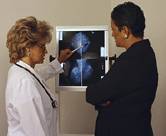 A service of the U.S. National Library of Medicine
A service of the U.S. National Library of Medicine  National Institutes of Health
National Institutes of Health

Dense Breasts Not Linked to Cancer Deaths

MONDAY, Aug. 20 (HealthDay News) -- Highly dense breast tissue is known to increase the risk of breast cancer, but it does not increase a woman's odds of death if she does develop the disease, a new study finds.
"It is reassuring that elevated breast density -- a prevalent and strong breast cancer risk factor -- was not associated with risk of breast cancer death or death from any cause," said Gretchen Gierach, a researcher at the U.S. National Cancer Institute.
Both dense breast tissue and tumors appear white on mammograms, so it is harder to detect breast cancers in women with dense breasts, Gierach said. High density also is linked with increased tumors, independent of the problem with detection, she said.
Few studies, however, have looked at the connection between dense breasts, which have relatively little fat, and survival once a woman gets breast cancer.
In the study, published online Aug. 20 in the Journal of the National Cancer Institute, researchers identified more than 9,000 women diagnosed with invasive breast cancer between 1996 and 2005 and followed them for more than six years, on average. The average age at diagnosis was 59.
Using information gleaned from mammograms, radiologists rate density levels in four categories, ranging from very low to very high. About 84 percent of the women fell into the middle two groups, neither very high nor very low.
During the follow-up, nearly 1,800 women died, about 900 of them from breast cancer. The researchers found that high breast density was not linked to risk of death from breast cancer or other causes.
They did, however, find that low density was linked with an increased risk of breast cancer death among patients who were obese or in those who had larger tumors.
What might account for the association? Gierach said breasts with a higher percentage of fat may foster an environment that helps cancers grow.
Dr. Anne McTiernan, a member of the Fred Hutchinson Cancer Research Center in Seattle, said the new study is the largest yet to examine the association between breast density and death from breast cancer.
"The large size of the study allowed more detailed looks into subgroups," McTiernan said.
One drawback, she said, is that detailed information on treatments was unavailable, a limitation the researchers acknowledged.
The link between low-density breasts in obese women and higher death risk is not surprising, McTiernan said. "Obesity has been shown repeatedly to be associated with increased death and recurrence in breast cancer," she said.
Breast density decreases with age. "Low density means the breast is almost all fat, which is what is seen especially in postmenopausal obese women," McTiernan said.
Another expert, Dr. Louise Eriksson, a researcher at the Karolinska Institute in Stockholm, Sweden, said the study shows that "the prognosis for breast cancer patients with dense breasts compared to other breast cancer patients is not aggravated by the fact that they have dense breasts."
She said she finds it surprising that even though highly dense breasts decrease the chance that a cancer is found on a mammogram, delaying the diagnosis, the delay does not seem to affect survival.
"However, since women with dense breasts are at greater risk of developing breast cancer, they will still have an increased risk of dying compared to the general population," Eriksson said. "High mammographic density is therefore still an important concern in the general population."
To reduce the risk of breast cancer, women can exercise, control their weight and get screened for breast cancer regularly, according to the U.S. Centers for Disease Control and Prevention.
SOURCES: Gretchen Gierach, Ph.D., M.P.H., researcher, U.S. National Cancer Institute; Anne McTiernan, M.D., Ph.D., member, Fred Hutchinson Cancer Research Center, Seattle; Louise Eriksson, M.D., Ph.D. candidate, Karolinska Institute, Stockholm, Sweden; Aug. 20, 2012, Journal of the National Cancer Institute
- More Health News on:
- Breast Cancer